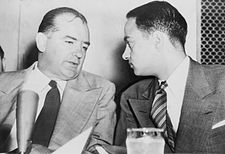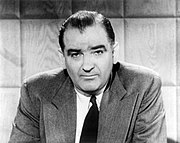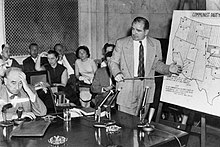
Joseph Raymond McCarthy was an American politician who served as a Republican U.S. Senator from the state of Wisconsin from 1947 until his death at age 48 in 1957. Beginning in 1950, McCarthy became the most visible public face of a period in the United States in which Cold War tensions fueled fears of widespread communist subversion. He alleged that numerous communists and Soviet spies and sympathizers had infiltrated the United States federal government, universities, film industry, and elsewhere. Ultimately, he was censured for refusing to cooperate with, and abusing members of, the committee established to investigate whether or not he should be censured. The term "McCarthyism", coined in 1950 in reference to McCarthy's practices, was soon applied to similar anti-communist activities. Today, the term is used more broadly to mean demagogic, reckless, and unsubstantiated accusations, as well as public attacks on the character or patriotism of political opponents.
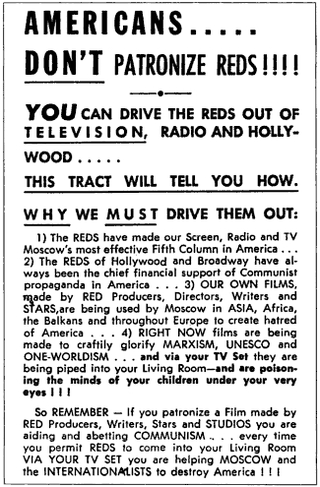
McCarthyism, also known as the Second Red Scare, was the political repression and persecution of left-wing individuals and a campaign spreading fear of alleged communist and Soviet influence on American institutions and of Soviet espionage in the United States during the late 1940s through the 1950s. After the mid-1950s, U.S. Senator Joseph McCarthy, who had spearheaded the campaign, gradually lost his public popularity and credibility after several of his accusations were found to be false. The U.S. Supreme Court under Chief Justice Earl Warren made a series of rulings on civil and political rights that overturned several key laws and legislative directives, and helped bring an end to the Second Red Scare. Historians have suggested since the 1980s that as McCarthy's involvement was less central than that of others, a different and more accurate term should be used instead that more accurately conveys the breadth of the phenomenon, and that the term McCarthyism is, in the modern day, outdated. Ellen Schrecker has suggested that Hooverism, after FBI Head J. Edgar Hoover, is more appropriate.

Roy Marcus Cohn was an American lawyer and prosecutor who came to prominence for his role as Senator Joseph McCarthy's chief counsel during the Army–McCarthy hearings in 1954, when he assisted McCarthy's investigations of suspected communists. In the late 1970s and during the 1980s, he became a prominent political fixer in New York City.

Gerard David Schine, better known as G. David Schine or David Schine, was the wealthy heir to a hotel chain fortune who became a central figure in the Army–McCarthy hearings of 1954 in his role as the chief consultant to the Senate Permanent Subcommittee on Investigations.

Robert Ten Broeck Stevens was an American businessman and former chairman of J. P. Stevens and Company, which was one of the most established textile manufacturing plants in the US. He served as the Secretary of the Army between February 4, 1953, until July 21, 1955.
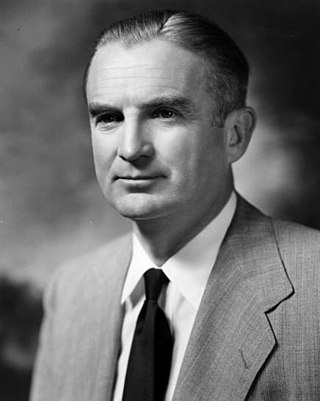
William Stuart Symington III was an American businessman and Democratic politician from Missouri. He served as the first Secretary of the Air Force from 1947 to 1950 and was a United States Senator from Missouri from 1953 to 1976.
Point of Order! is a 1963 American documentary film by Emile de Antonio about the Senate Army–McCarthy hearings of 1954.
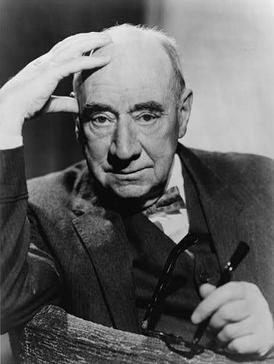
Joseph Nye Welch was an American lawyer and actor who served as the chief counsel for the United States Army while it was under investigation for Communist activities by Senator Joseph McCarthy's Senate Permanent Subcommittee on Investigations, an investigation known as the Army–McCarthy hearings. His confrontation with McCarthy during the hearings, in which he asked McCarthy "At long last, have you left no sense of decency?", is seen as a turning point in the history of McCarthyism.
The Permanent Subcommittee on Investigations (PSI), stood up in March 1941 as the "Truman Committee," is the oldest subcommittee of the United States Senate Committee on Homeland Security and Governmental Affairs. After the September 11, 2001, terrorist attacks in the United States, the Committee broadened its title to Homeland Security and Governmental Affairs Committee. PSI led the Committee's broad mandate to "investigate inefficiency, mismanagement, and corruption in Government."
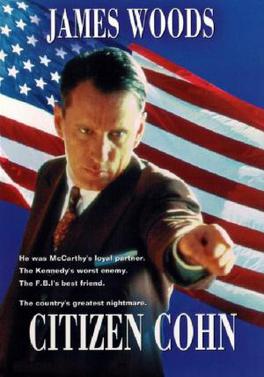
Citizen Cohn is a 1992 made-for-TV movie covering the life of Joseph McCarthy's controversial chief counsel Roy Cohn. James Woods, who starred as Cohn, was nominated for both an Emmy and a Golden Globe for his performance. Citizen Cohn also stars Joe Don Baker, Ed Flanders, Frederic Forrest, and Pat Hingle. It was directed by Frank Pierson. The movie was based on the 1988 book of the same name by Nicholas von Hoffman; it was filmed on location in Pittsburgh, Pennsylvania.
Frederick George Fisher Jr. was an American lawyer who first entered the public eye in connection with Senator Joseph McCarthy.
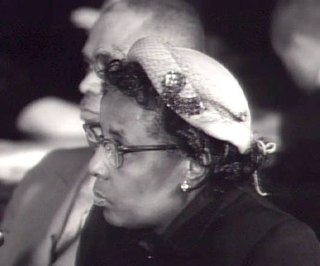
Annie Lee Moss was a communications clerk in the US Army Signal Corps in the Pentagon and alleged member of the American Communist Party. She was believed to be a security risk by the FBI and her superiors at the Signal Corps, and was questioned by United States Senator Joseph McCarthy in his role as the chairman of the Senate Permanent Subcommittee on Investigations. The highly publicized case was damaging to McCarthy's popularity and influence.
James Draper St. Clair was an American lawyer, who practiced law for many years in Boston with the firm of Hale & Dorr. He was the chief legal counsel for President Richard Nixon during the Watergate scandal.
This is a list of notable events in the history of LGBT rights that took place worldwide in the 1950s.
The Green Feather Movement was a series of college protests directed against McCarthyism at the height of the Red Scare in the United States. The movement arose in response to an attempt to censor Robin Hood because of its alleged communist connotations and eventually spread to universities across the nation.

Herman Struve Hensel was an American international lawyer who served in several senior positions in the Department of the Navy and the Department of Defense from 1941 to 1946 and from 1952 to 1955.

Irving Peress was an American dentist and military officer who became a primary target for investigation of alleged communist leanings during the 1954 Army–McCarthy hearings.
Samuel Reber III was a diplomat who spent 27 years in the Foreign Service of the United States, including several years with the Allied High Commission for Germany. Threats by Senator Joseph McCarthy to reveal a homosexual incident in his past forced him to resign quietly from the State Department in 1953. McCarthy later publicly alleged that Reber had been forced to retire because he posed a "security risk."
Theodore Kaghan was an American civil servant and journalist.
Ray Howard Jenkins was an American lawyer, active primarily in Knoxville, Tennessee, and the surrounding region, throughout much of the 20th century. He is best known for his role as special counsel to the Senate Subcommittee on Investigations during the 1954 Army-McCarthy Hearings, earning broad praise for his aggressive questioning of the hearings' two complainants, Senator Joseph McCarthy and Secretary of the Army Robert T. Stevens. Jenkins appeared on the cover of Time at the height of the hearings on May 17, 1954.
